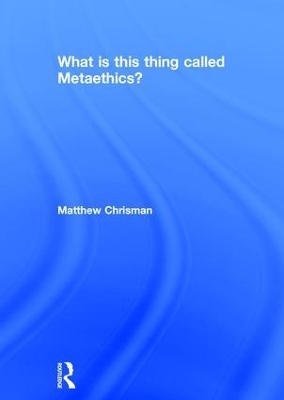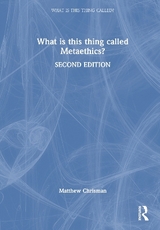
What is this thing called Metaethics?
Routledge (Verlag)
978-1-138-82760-8 (ISBN)
- Titel erscheint in neuer Auflage
- Artikel merken
• ethical reality: including questions about naturalism and non-naturalism, moral facts, and the distinction between realism and antirealism
• ethical language: does language represent reality? What mental states are expressed by moral statements?
• ethical psychology: the Humean theory of motivation and the connection between moral judgement and motivation
• ethical knowledge: intuitionist and coherentist moral epistemologies, and theories of objectivity and relativism in metaethics
• new directions in metaethics, including non-traditional theories and extensions to metaepistemology and metanormative theory.
Additional features such as chapter summaries, questions of understanding, and a glossary make this an ideal introduction to metaethics.
Matthew Chrisman teaches and researches ethics, epistemology, and philosophy of language at the University of Edinburgh, UK. He also works on action theory, political philosophy, deontic logic and the ethics of climate change.
Acknowledgements
Preface
Introduction
Chapter 1. Four Key Issues
Questions about Ethics and Metaphysics
Questions about Ethics and Epistemology
Questions about Ethics and Philosophy of Language
Questions about Ethics and Philosophy of Mind
Chapter 2. Nonnaturalism
A More Precise Characterization
The Case for Nonnaturalism
Arguments against Nonnaturalism
Chapter 3. Expressivism
Arguments in Favor of Expressivism
Versions and Objections
Chapter 4. Error Theory & Fictionalism
Mackie’s Arguments for Error Theory
Objections and Replies
Versions of Fictionalism
Chapter 5. Naturalism
Neo-Aristotelian Naturalism
Relativism as a Form of Naturalism
A Posteriori Naturalism
A Priori Network Naturalism
Chapter 6. Summary and Chart
The Four Main Areas
Costs and Benefits
Chapter 7. Theories That Are Hard to Classify in Traditional Terms
Beliefs or Desires—Why Not a Bit of Both?
Ethical Facts—Why do they have to be "out there"?
Pragmatism
Chapter 8. Outstanding Issues
From Metaethics to Metanormative Theory
From Metaethics to Metaepistemology
Glossary
Index
| Erscheinungsdatum | 08.01.2017 |
|---|---|
| Reihe/Serie | What is this thing called? |
| Zusatzinfo | 4 Tables, black and white; 3 Illustrations, black and white |
| Verlagsort | London |
| Sprache | englisch |
| Maße | 174 x 246 mm |
| Gewicht | 476 g |
| Themenwelt | Geisteswissenschaften ► Philosophie ► Erkenntnistheorie / Wissenschaftstheorie |
| Geisteswissenschaften ► Philosophie ► Ethik | |
| ISBN-10 | 1-138-82760-6 / 1138827606 |
| ISBN-13 | 978-1-138-82760-8 / 9781138827608 |
| Zustand | Neuware |
| Informationen gemäß Produktsicherheitsverordnung (GPSR) | |
| Haben Sie eine Frage zum Produkt? |
aus dem Bereich


![Was heißt Denken?. Vorlesung Wintersemester 1951/52. [Was bedeutet das alles?] - Martin Heidegger](/media/113619842)
